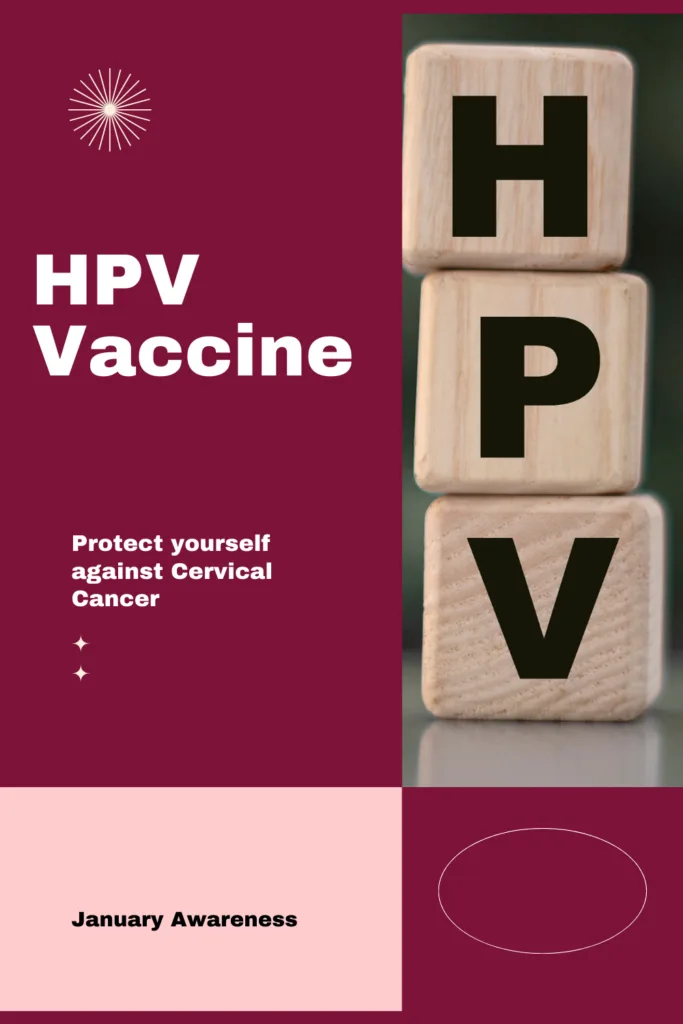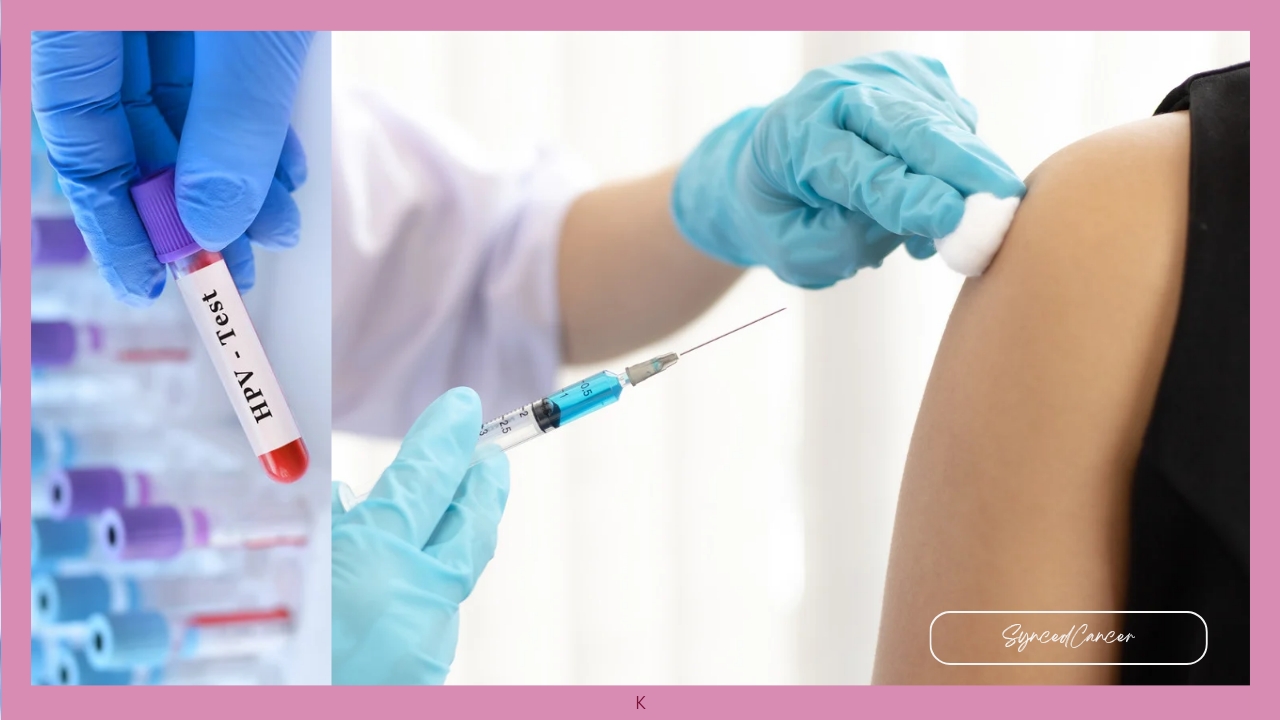Cervical cancer. Why? Because January is Cervical Cancer Awareness Month! This month is all about education, advocacy, and prevention, and one of the biggest players in this fight is the HPV vaccine. The HPV vaccine is proof that prevention works. By reducing the burden of HPV-related cancers, this vaccine has already saved countless lives.
Raising awareness about the HPV vaccine also means tackling myths and misinformation. For example, some people think the vaccine encourages promiscuity (it doesn’t) or that it’s unsafe (it’s been extensively studied and is very safe). The more we talk about it, the more we empower people to make informed decisions about their health.
But here’s a plot twist that’s been stirring the science world: could the HPV vaccine, famous for preventing cervical cancer, also have an impact on breast cancer? The connection isn’t fully understood, but it’s still a topic worth exploring because science is always evolving.
What Is HPV, and Why Is It Such a Big Deal?
If HPV were a person, it’d be that uninvited guest who shows up at your party, overstays their welcome, and leaves you cleaning up a mess long after they’re gone. In plain terms, HPV (Human Papillomavirus) is the most common sexually transmitted infection in the world. If you’ve been sexually active, chances are high that you’ve encountered it at some point—don’t worry, you’re not alone!
There are over 100 types of HPV, but not all of them are bad news. Some are harmless and go away on their own, while others are high-risk and capable of causing serious health issues. The notorious culprits? HPV types 16 and 18, which are responsible for most cervical cancer cases, as well as other cancers in the throat, anus, and genitals.
The virus spreads primarily through skin-to-skin sexual contact, and because it’s so sneaky, most people don’t even know they’ve been infected. But when HPV decides to cause chaos, it messes with your cells, leading to abnormal growths that can turn into cancer if left unchecked.

The HPV Vaccine: A Game-Changer in Cancer Prevention
HPV Vaccine is the shield your immune system wears to protect against the most dangerous types of HPV. It’s designed to protect against those high-risk HPV types before they can cause any wahala. Approved for use in many countries, this vaccine has been a literal lifesaver, drastically reducing the rates of HPV infections and cervical precancers since its introduction.
Here’s how it works:
- The vaccine trains your immune system to recognize and destroy the high-risk HPV types before they can cause trouble.
- It’s most effective when given to people before they’re exposed to HPV—usually preteens (ages 9 to 12). But don’t worry, young adults can still benefit from it too!
The HPV vaccine has proven to be a public health success story, with some countries reporting a dramatic decline in cervical cancer rates among vaccinated populations. But cervical cancer isn’t the only thing the vaccine protects against. It also helps prevent other HPV-related cancers, like those in the throat, vulva, and anus.
Connection Between Breast Cancer and HPV Vaccine?
Breast cancer and cervical cancer are two completely different diseases with different risk factors. Cervical cancer is directly linked to HPV, but breast cancer? Not so much.
However, some researchers have started asking an interesting question: Could HPV play a role in breast cancer too?
Here’s why this question even exists:
- HPV DNA has been found in some breast cancer tumors. In certain studies, scientists detected traces of high-risk HPV types (like 16 and 18) in breast cancer tissue. This led to the theory that HPV might somehow sneak into breast cells and trigger changes that could lead to cancer.
- HPV is already known to cause other cancers. It’s the main culprit behind cervical cancer and is linked to cancers in the throat, anus, and genitals. So, it’s not far-fetched to wonder if it could be involved in breast cancer too.
But before we get ahead of ourselves, it’s important to note that the evidence is mixed. While some studies suggest a connection, others find no trace of HPV in breast cancer cases. Many researchers believe that if HPV does play a role in breast cancer, it’s probably a rare occurrence and not a major cause of the disease.
Can the HPV Vaccine Prevent Breast Cancer?
If HPV is linked to breast cancer, could the HPV vaccine help prevent it?
Unfortunately, the answer isn’t straightforward. The HPV vaccine was specifically designed to target the types of HPV that cause cervical cancer and a few other HPV-related cancers. Breast cancer, on the other hand, has a completely different set of risk factors, including:
- Genetics: Mutations in genes like BRCA1 and BRCA2 significantly increase breast cancer risk.
- Hormonal changes: Long-term exposure to estrogen can fuel certain types of breast cancer.
- Lifestyle factors: Smoking, obesity, alcohol use, and lack of exercise all contribute to risk.
Even if HPV is involved in a small percentage of breast cancer cases, it’s unlikely that the vaccine would have a major impact on breast cancer rates. So, while the HPV vaccine is a rock star in cancer prevention, it’s not an all-in-one solution.
What You Can Do This Cervical Cancer Awareness Month
- Get Vaccinated: If you’re eligible, don’t wait! The HPV vaccine is safe, effective, and could save your life.
- Educate Others: Many people still don’t know that cervical cancer is preventable. Share information, bust myths, and encourage your loved ones to get vaccinated.
- Stay On Top of Breast Health: While the HPV vaccine may not prevent breast cancer, regular self-exams, mammograms, and knowing your family history can go a long way in early detection.
- Support Research: Science needs funding and advocacy to keep moving forward. Whether it’s donating to cancer research or participating in awareness campaigns, every little bit helps.
Conclusion
The HPV vaccine may not be a magic bullet for all cancers, but it’s one of the most powerful tools we have for cancer prevention. As we shine a spotlight on cervical cancer this January, let’s also celebrate the progress we’ve made in the fight against HPV-related cancers.
And who knows? As research continues, we might uncover even more ways the HPV vaccine can make a difference. Until then, let’s spread the word, stay informed, and take charge of our health. After all, prevention is better than cure, and nothing is more powerful than knowledge. 💜
Conclusion
ScienceDirect – https://www.sciencedirect.com/science/article/pii/S2405844024130587#
Accessed January 19th, 2025











What do you think?
It is nice to know your opinion. Leave a comment.